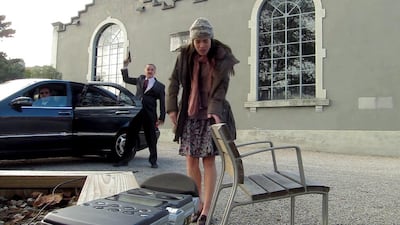Starting today, the film world will focus on a relatively small strip of fancy hotels and restaurants by the Mediterranean in Southern France.
The Cannes International Film Festival is back for 12 days of frantic movie deal-making, pap shots of celebrity types enjoying themselves on millionaires’ yachts and some of the most expensive croissants known to mankind.
Amid a year-round season dotted with important international festivals, Cannes remains the movie event to attend, to show your film and to schmooze with the stars (or, ideally, the moguls who will help make you a star).
But despite the impending din of the critics chewing over their pens to find the most imaginative ways to take down the latest labours of the world’s finest directors, and the endless column inches that will be dedicated to someone or other saying or doing something stupid in a press conference (is Shia LaBeouf attending?), there’s room for some harsh assessment before the first bottle-enhanced leg makes its first well-heeled appearance on the red carpet. And it comes from the Middle East.
Arab cinema thin on the Croisette
While we may have had the best 12 months for Arab cinema on the international stage for some time, with three Oscar nods, this year's Cannes selection is disappointingly thin on the ground. Among the very few regional titles to have made the cut in the festival's 67th year are The Aftermath of the Inauguration of the Public Toilet at Kilometer 375, a Chekhov-inspired student short in the Cinefondation competition and Egypt's first-ever entry in the category that ought to win its director Omar El Zohairy some sort of prize for the title alone. Then there's Challat of Tunis, the Dubai International Film Festival-supported feature, in which the Tunisian filmmaker Kaouther Ben Hania sets out to find the man who, in the summer of 2003, prowled the streets with a razor blade looking to slash women's buttocks. Challat screened in Dubai last year and will open the Cannes Acid programme. But these are the only two up for awards. Also, media and entertainment organisations in Abu Dhabi and Dubai have united at the UAE Pavilion at Cannes to promote the United Arab Emirates's emerging film industry. That includes representatives from the Abu Dhabi, Dubai and Gulf film festivals, as well as twofour54 and the Dubai Film Market.
In contention
Elsewhere, however, Cannes offers its usually eclectic mix and its main competition is a veritable melting pot of young and old, iconic and emerging star.
Of the 18-strong selection vying for the prestigious Palme d'Or, there's a nearly six-decade age gap between the 83-year-old Jean-Luc Godard, bringing his first 3-D feature, Goodbye to Language, complete with a typically lofty Godard-esque synopsis, and the French-Canadian filmmaker Xavier Dolan, 25, who has seemingly had the "wonderkid" title hanging around his neck since his second feature, Heartbeats, premiered in Cannes' Un Certain Regard category in 2010. Dolan will be competing with Mommy, a film about a widowed single mother raising a violent son.
David Cronenberg teams up again with flashbulb-favourite Robert Pattinson for Maps to the Stars, a satire on Hollywood, also starring Mia Wasikowska, Julianne Moore and Star Wars-returnee Carrie Fisher. Many will be hoping the film fares better than Cronenberg's previous Pattinson-starring and Cannes-premiering feature, Cosmopolis, two years ago.
A hot tip for the Palme could be Winter Sleep by Nuri Bilge Ceylan, based on the Turkish director's outstanding 2011 film Once Upon a Time in Anatolia, and the fact that it has been shrouded in mystery. Then there's The Search, Michel Hazanavicius's follow-up to the all-conquering The Artist, again starring his wife Bérénice Bejo, but this time in a distinctly un-Artist-like story set in Chechnya about the hunt to find a lost boy's mother. Don't expect any tap-dancing or performing dogs. Marion Cotillard appears in the Dardennes brothers' thriller Two Days, One Night in which she must convince her colleagues to give up their bonuses for her to keep her job (fingers crossed it's more exciting than it sounds), while Steve Carell takes a leap from his Anchorman character Brick in Moneyball director Bennett Miller's Foxcatcher, about a schizophrenic millionaire and his ill-fated relationship with two Olympic wrestling brothers.
The big showdown – and a princess
But many expect the main competition to be a tussle between Cannes' two favourite Brits, Ken Loach and Mike Leigh. Loach heads to France with his final feature, Jimmy's Hall, in which he returns to the subject of Ireland's modern political history, while Leigh brings Mr Turner, a biopic of the painter J M W Turner, played by Timothy Spall. For the first couple of days, however, the noise is likely to centre on the festival's controversial Nicole Kidman-starring opener Grace of Monaco, which has come under fire not just by Monaco's royal family for its "pointlessly glamorised" depiction of their late iconic princess but – if you believe the reports – the film's own producer Harvey Weinstein. Could it be another Diana?
For screams and swoons, competing in the Un Certain Regard section, is Lost River, the directorial debut by current do-no-wronger pretty boy Ryan Gosling – a dark fantasy starring Saoirse Ronan, Christina Hendricks and Eva Mendes. Although Gosling hasn't cast himself, comparisons to Ben Affleck have begun and this is likely the title to be dominating headlines in publications not usually fussed about art-house cinema.
The Middle East’s absence aside, Cannes once again throws up an impressive assortment of big names. Likely, one not on the watch list will capture the critic’s collective imaginations and a new star will be born. And that, aside from parties, paparazzi and pricey pastries, is what the festival is all about.
artslife@thenational.ae

